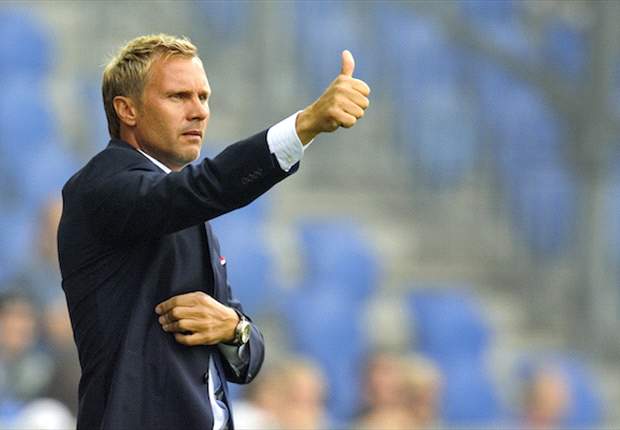Thorsten Fink: An Overview
/After the home game against Apollon Limassol last season, I thought the Apoel board had nailed it. Granted, Bruno Vale and Giorgos Merkis had a game to forget, but Apoel displayed strong signs that they had improved markedly since the 1st round game which they lost in Limassol. Apoel didn’t sweep their opponents away. What they did was control the vast majority of the game by pressing effectively and prohibiting Apollon from freely expressing their natural counter attacking style - despite Hamdani and Sangoy’s chances.
That game, along with Apoel’s complicated double win, seems a long time ago. Giorgos Donis has been dismissed and replaced by Thorsten Fink. Fink, a former midfielder, is mostly known for his six years playing for Bayern Munich, as well as his time as a German international. He retired in 2006 and quickly proceeded to prolong his involvement in the game under various managerial posts.
As a manager, Fink’s first full time job came with FC Ingolstadt 04 offering him a shot at the helm. The league was in the process of a restructuring and the club had to finish in the top half of the table ( >10th position) in order to qualify for the newly introduced 3rd division. Fink took over in January and managed to far exceed the base requirements for the job by finishing second. Next season didn’t prove as fruitful for Fink; he was fired in April of 2009.
Following Fink’s spell with Ingolstadt was his tenure as FC Basel manager. That is undeniably his managerial peak as of now. Fink took over from Christian Gross, who had a disappointing season the year prior, managing to finish 3rd in the Swiss Super League. Notably, that was the season that saw a young player by the name of Xherdan Shaqiri make his move to the senior team. Shaqiri has recently moved to Inter Milan, having been sold to Bayern Munich from FC Basel in 2012.
image by goal.com
Basel had a great season. They dominated domestically, winning both the league and Swiss cup. They gathered 9 points in the Europa League group stage, but only finished 3rd behind Roma and Fulham. The following season, Basel integrated Granit Xhaka into the first team, won the league and qualified for the Champions League group stage. Again, they came 3rd, behind Roma and Bayern Munich. Fink would mostly deploy a 4-4-2 with Shaqiri playing as an advanced right-winger, with Marco Streller and Alexander Frei as a more than competent front two.
Basel’s most important season of recent times was a strange one for Thorsten Fink. Few can forget Basel’s games against Sir Alex Ferguson’s Manchester United. They drew 3 -3 at Old Trafford and famously defeated United in Switzerland with Streller and Frei both finding the net. It was not Fink who guided Basel to that famous win, however, but his former assistant Heiko Vogel. Fink had left in October to manage Hamburger SV. The Bundesliga was as kind to Fink as the Swiss Super League. He was swiftly fired after a dire run of games brought the team down to 15th place.
There was an incident during Fink’s time at Basel that is somewhat worrying. He allegedly made a racist remark in reference to Fwayo Tembo. I couldn't find more details about this, however, some would deem it unwise to bring a manager with something like this attached to his name, especially to a team that’s had its fair share of racist accusations in recent history. What is pleasing is that already there have been Apoel fans and bloggers bringing this up and expressing a desire for their club to disassociate itself with racists.
Fink’s first press conference involved the usual chatter about how great a club he’s joined, but he also made some interesting points. He appears to be quite ambitious, eagerly conveying his aim of raising the bar at Apoel. It’s important that teams in Cyprus understand the value of this. We have seen our fair share of players and managers joining teams here solely for the wages, having neither the energy levels nor the freshness to contribute to their team. I’m sure I’ll belabour this point in future posts, but I’ll leave it here for now. Fink made three other points of note. He said he’d like to bring in more young players, without, however, forgetting the need to maintain a balance in the squad. He praised the physical condition of his players, directly referencing the 123 kilometers they completed in their game against Ajax. Finally, he spoke of his desired playing style, saying that a team like Apoel mustn’t always play with counter attacks, but that it also needs to be able to play possession football, a style of football that Apoel is definitely not alien to.
Fink’s press conference can be found here (audio): https://soundcloud.com/robocopgt13/fink-parousiasi
Since then, Apoel has had its first game under its new manager, a cup game against Olympiakos Nicosia, winning one nil away from home. After the game, Fink pulled no punches, saying that Apoel hadn’t played very well, and bemoaned the lack of speed with which his team operated on the pitch.
It would be unwise to rush to judgement. In fact, can he properly be judged at all this season? Barring some horrendous results or performances, Fink will make a proper mark on Apoel next season, when he’ll be able to further shape the squad to his liking. He needs to show that his spell in Basel was not a fluke, that he is truly the manager a great deal of people praised in 2011, a period in which he was briefly touted for the Schalke job. Apoel fans, being true to their Cypriot idiosyncrasies, are not often patient with managers, but seem optimistic for the future and appear to be placing plenty of trust in the board’s decision to hire Fink. Time will soon tell if they are right.
Kyriacos Nicolaou











